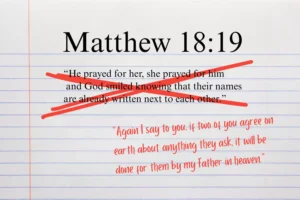During a discussion about difficult moral questions, a co-worker once caught me off-guard with the statement: “Everything is black and white.”
Wait a minute. I thought that one of the hallmarks of growing mature in faith was the ability to think critically and live well in the “gray areas” of life. How could my friend suggest that those areas didn’t exist?
Further conversation and reflection brought out this point: There aren’t many things that are truly morally ambiguous. God’s Word speaks clearly of things that He forbids and illustrates over and over how seriously He takes it when we flout His Law on those matters. The Bible also celebrates many, many things that He permits, invites or commands. And really, that’s all. The black and the white, so to speak. There’s not much middle ground in Scripture.
What really bowled me over about that thought is that the church has spent an awful lot of time and energy throughout history calling things wrong that God calls right. Or drawing a hard line where God hasn’t spoken at all. When we take the whole counsel of Scripture seriously, the message that emerges is this: If God hasn’t specifically prohibited something, we have freedom. Likely much more freedom than we admit to ourselves or to each other. There is so much that God affirms through the Bible.
But most of us know that daily life doesn’t feel black and white. Moral decisions aren’t always easy. The right thing to do isn’t always clear. And freedom isn’t commonly associated with following God’s Law. Why is that?
The confusion comes when the freedom areas bump into the forbidden areas. Or even when two good things bump into one another. This is the trap the Pharisees are always trying to catch Jesus in. You can’t heal a person if it’s the Sabbath, they say. You can’t pick grain if it’s the Sabbath, they say. Two good things — healing and Sabbath keeping, or Sabbath keeping and eating when you’re hungry — seem to be at odds with each other. Jesus masterfully helps sort out the dilemma by reminding the law-keepers of the spirit behind each of those laws. In both cases, Jesus’ interpretation of the Law is freeing, life-giving and people-affirming.
Here’s the thing about taking a view of Scripture that emphasizes our freedom, though: If we’re going to read it that way, we really have to read it and know what it says. Otherwise we’re always just steps away from being enslaved by our freedoms.
Beside the example that Jesus repeatedly sets, Romans 14 and 1 Corinthians 8 and 10:14-33 are masterful counsel — brilliant social science, really — about how to sort out these “disputable matters.” Just like Jesus, Paul reminds us of what our priorities should be in applying the Law. If you haven’t studied these passages in depth, I challenge you to do so and see how it transforms the difficult spots in relationships and moral decision-making. And when you’re done with those passages, keep reading until you’ve read the whole Bible. And then do it again. Don’t ever stop. Drink deeply of your freedom in Christ. Take to heart the things God hates and learn why He hates them. When you do, you’ll find yourself growing in freedom and in your delight in God’s Law.










